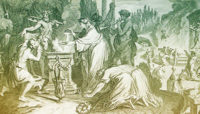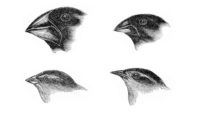By Ken Ham The Bible uses strong language to describe any form of compromise with worldly thinking. And it doesn’t just apply to the ancient Israelites. …read more Source: AIG Daily
By Troy Lacey Atheists hold to naturalism and materialism and they are supposed to disavow anything supernatural or spiritual. . . but do they? …read more Source: AIG Daily
Stick insect research upsets one of evolutionists’ long-held beliefs …read more Source: creation.com
Loss of flight several times is not evolution, no new structures, no new genes. …read more Source: creation.com
By Ken Ham How did Noah fit the animals on the ark? Would the ark really have floated? What evidence is there that this event actually happened? These are some of the common questions we’re asked by skeptics and others about the biblical account of the global flood. We answer these questions, and many more, throughout the Ark Encounter and the Creation Museum in Northern Kentucky as well as on our website. There are good answers to these questions! Did you know Noah wasn’t commanded to take two of every species on the ark, as skeptics often claim? For example, [More]
A critic who fires off many rhetorical rockets at once is seriously misinformed …read more Source: <a href=https://creation.com/a/13567 target=_blank title="A knocker answered” >creation.com
What would you include in an image of the global Flood of Noah? Nineteenth century artist Edward Burne-Jones depicted a pterosaur, consistent with the biblical text. …read more Source: creation.com
Can naturalistic theories explain their origin and properties? …read more Source: creation.com
By Ken Ham The iconic hymn-writing duo, Keith and Kristyn Getty, is coming to perform at perhaps their most unique venue ever—the life-size Noah’s Ark attraction on October 9, 2019. You won’t want to miss this one-of-a-kind event, so purchase your tickets today! A variety of tickets are available, including VIP seating, which includes a special reception and meet-and-greet event. You’ll enjoy appetizers, drinks, and desserts crafted by our in-house chef while you meet the Gettys and Mally and me before the concert begins. Visit the events page for all the details and the various tickets available. Don’t miss this [More]
Dr. William Trollinger, professor at the University of Dayton, recently launched an attack on the Ark Encounter and Ken Ham on his supposed “scholarly” blog. …read more Source: AIG Daily
On the evening of Friday, August 2, 154 creation enthusiasts attended an astronomy-themed evening at the ICR Discovery Center for Science and Earth History. By all accounts, everyone had a wonderful time. The evening’s activities included showings of the ICR planetarium show Creation in the Solar System. Then, local creation scientists h… More… …read more Source: icr.org
By Dr. Don DeYoung What if we could design tape and adhesives that automatically cleaned themselves every time they got dirty or wet? …read more Source: AIG Daily
By Ken Ham Darwin’s seminal work is often abbreviated as Origin of Species, so you would think his book would explain the origin of the species. But that’s exactly what Darwin can’t explain, according to a Replacing Darwin! We’re going to send Gelernter a copy of Harvard-trained Dr. Nathaniel Jeanson’s book Replacing Darwin. This book powerfully demonstrates, from a genetic perspective, what Gelernter is saying—Darwin doesn’t explain the origin of species (or the origin of the information and code system in DNA). But Replacing Darwin goes further than that. It lays out a testable prediction, based on a biblical creation [More]
By Ken Ham We want as many young people as possible to visit the Ark Encounter and the Creation Museum in Northern Kentucky and learn of the truth of God’s Word and the gospel message. That’s why we offer special pricing options for children and youth, as well as free admission for every child 4 and under. And we’ve made it even easier for you to bring your entire youth, middle school, or Christian school group with our very popular Ark Encounter and Creation Museum Overnight Adventures programs. Each attraction has a different overnight experience to offer. With our Overnight [More]
Why did we build the ICR Discovery Center for Science & Earth History? What solved mystery near Norway confirms Flood geology? How do bats, bees, and butterflies reveal the intricate design of God’s handiwork? And where did faces come from? Discover the answers to these questions and more in the August 2019 issue of Acts & Facts! &… More… …read more Source: icr.org
By Bodie Hodge One of the most frequently-asked questions we receive is about Genesis 1:3–3 and specifically, “What was the light source on days 1-3 if not the sun?” …read more Source: AIG Daily
By Ken Ham It’s back to school season in America, and we have you covered for last-minute curriculum needs. Our online store is currently offering a back-to-school sale (through the whole month of August) where you will enjoy 20% off all our curricula! Our online store is currently offering a back-to-school sale (through the whole month of August) where you will enjoy 20% off all our curricula! This includes wonderful curriculum sets such as God’s Design for Science, Wonders of the Human Body, Introduction to Logic, …read more Source: Ken Ham AIG
By Tim Chaffey Out of nowhere, the expression “giants on the earth” pops up in Genesis 6:4. What does it mean? …read more Source: AIG Daily
Scientific investigation supports the idea that we descend from an original couple. …read more Source: creation.com
By Troy Lacey While many believe Sodom and Gomorrah were destroyed because of rampant homosexual behavior, others say Sodom and Gomorrah were destroyed because of pride. …read more Source: AIG Daily
By Ken Ham When I travel and speak, or when I am meeting guests here at the Creation Museum or at the Ark Encounter in Northern Kentucky, I am asked many of the same questions about our two world-class Christian themed attractions. Here are some of the most-asked questions and our exciting new way to answer them: We need more time than one day to experience everything at these attractions. How can we do this? We would love to regularly bring our children and/or grandchildren to the remarkable playgrounds. Is there a way to do this? Can we come to [More]
A reader claims that we were unfair in our assessment of another Christian’s research. We respond. …read more Source: creation.com
Does the reviled coyote deserve its reputation? …read more Source: creation.com
By Ken Ham We’re on volume 14 of our award-winning (11 EPA awards this year) biblical worldview magazine, Answers. Since 2009, we’ve had professional readers turn the written articles into audio articles. We now have over 100 hours of audio content from a decade of the magazine. That’s an incredible amount of great content! So our magazine team has launched a brand-new podcast to allow you to enjoy the best of those audio articles. And that new podcast is now available as Creation Answers. Each article starts with the perspective that God’s Word is true, from the very first verses. [More]
By Sarah Chaffee On this episode of ID the Future, Michael Egnor interviews philosopher Edward Feser about Feser’s new book Aristotle’s Revenge: The Metaphysical Foundations of Physical and Biological Science. Scientists can get along without Aristotle’s metaphysics, says Feser, but science can’t; in fact science presupposes Aristotle. Mechanistic views of nature have tried to make nature nothing but particles interacting, but a full understanding of nature requires that we include Aristotelian purpose, or teleology, and essences as well. Ultimately, Feser suggests, this leads us toward evidence for a divine mind behind it all. Your browser does not support playing Audio, [More]
By Dr. Terry Mortenson Was Genesis 1 written from the perspective of “God’s time,” unlike the rest of Scripture? …read more Source: AIG Daily
By Sarah Chaffee On this episode of ID the Future from the vault, Ann Gauger discusses so-called “junk” DNA. She explains species-specific mobile genetic elements and how our DNA is used. Listen in to learn about our computer-like genome! Your browser does not support playing Audio, please upgrade your browser or find our podcast on podOmatic Download Episode …read more Source: id the future










































